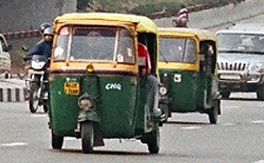Sustainable management of two-and three-wheelers in Asia

This new working paper by ICCT identifies the most effective technologies for CO2, emissions and safety measures and maps the status of regulatory programs for 2- and 3-wheeler management in Asian countries.
The large share of two- and three-wheelers in Asian countries pose significant challenges to air-quality, public health and road safety. Emission standards and technologies that have been applied for decades to control pollution from passenger cars have not fully migrated to two- and three-wheelers. Fuel economy standards, which offer great potential for reducing transportation sector energy consumption, have not been implemented in most countries/regions for this mode of transportation. Robust regulatory programs, such as compliance and enforcement programs, in-use control, OBD and evaporative controls that guarantee optimum performance have been employed only sparsely and most Asian regions lack such safeguards. This paper identifies the most effective technologies for CO2, emissions and safety measures and maps the status of regulatory programs for two- and three-wheeler management in Asian countries.
Best practice policy recommendations for emissions reduction, fuel economy standards and safety are provided.
See Also
Document: Air quality & transportation challenge in south asia.
Book: The leapfrog factor - clearing the air in Asian cities.
Report: Opportunities to reduce pollution and fuel use.
Report: Air pollution control in the transportation sector.
Report: Review of existing cap on the number of three-wheelers in Delhi and its implications for pollution.
Report: Improving Urban Air Quality in South Asia.
Report: 2 and 3 Wheeler in India.
